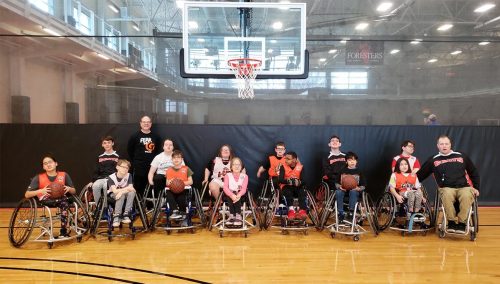New Book Highlights Area’s Role in Lifting World War II Veterans’ Spirits Through Wheelchair Basketball

By David A. F. Sweet
More than 16 million men and women fought for the United States in World War II. Those who survived returned home as heroes, but a significant portion could never walk again, confined to wheelchairs from enemy bullets or bombs. For those who had thrived in sports before the war, it seemed their days of competition were extinguished — an almost unbearable loss for those already suffering.
Though confined to their metal contraptions, they turned out to be wrong. Years before the Paralympics launched, veterans who were permanently paralyzed from the waist down began to play wheelchair basketball. The sport became so popular in the late 1940s and 1950s that the most famous arenas of that era — including Chicago Stadium — hosted games.
Few know how wheelchair-basketball pioneers in the Chicago area and Illinois buoyed the movement. That story — along with the rise of wheelchair basketball overall — is skillfully recounted by author David Davis in Wheels of Courage, his new book published by Center Street, part of Hachette Book Group.

The new book shows Chicago and Illinois were integral to the success of wheelchair basketball.
The Chicago area and Illinois, he said, were integral to the success and longevity of wheelchair basketball, and the Los Angeles-based author offered a number of examples to prove it. But no person had a bigger influence, he said, than Timothy Nugent, the mastermind behind the National Wheelchair Basketball Tournament (Illinois hosted 10 of the first 15). In 1948, the war veteran — whose father was hearing impaired and sight impaired — was tasked with creating an educational and rehabilitation program for students with permanent disabilities at the University of Illinois in Galesburg.
“I realized very quickly … that they needed more than clinical therapy and more than counseling — they needed an opportunity to be alive and to sense a feeling of achievement and belongingness,” Nugent said in Wheels of Courage. Sports became the perfect avenue.
“Nugent helped establish a standard set of rules and was the driving force behind many innovations in the sport,” Davis said. “He also made sure that newspaper reporters wrote about the players and the tournaments.” After the finals of the 1956 National Wheelchair Basketball Tournament were played at the Chicago Amphitheater, the city’s most influential newspaper, the Chicago Daily Tribune, weighed in with the headline, “Not a Leg to Stand On, But They’re Great!”

“He told me that, in effect, wheelchair basketball saved his life,” author David Davis said of one of the Chicago-area players he interviewed.
The Vaughan Hospital in Hines, Illinois — a Veteran Administration facility — boasted one of the earliest wheelchair basketball teams, called the Gizz Kids. Amazingly, they won 27 straight games against non-disabled opponents who also competed in wheelchairs. They even beat the Chicago Stags, a pro team who were the precursor to the Bulls.
Though not a war veteran, Marv Lapicola — who lives in Schaumburg today — was a wheelchair basketball trailblazer. As a teenager, polio stole his ability to use one leg. At the University of Illinois, wheelchair basketball was a godsend.
“He told me that, in effect, wheelchair basketball saved his life,” Davis noted in an e-mail interview. “Playing wheelchair sports — he also played wheelchair football at U of I — helped him survive the trauma he faced and gave him something to look forward to. Instead of being a victim, he was a competitive athlete on a team again with a community of brothers.”

“It provides athletes opportunities to experience the camaraderie of teammates,” said Cindy Housner of GLASA, a Lake-Forest based organization which hosts two youth wheelchair basketball teams.
Today on the North Shore, the Great Lakes Adaptive Sports Association (GLASA) in Lake Forest serves more than 1,000 individuals who have a physical or visual disability through competitive sports activities. Executive Director Cindy Housner — who founded GLASA in 1999 — said wheelchair basketball was one of the first sports the non-profit provided and remains one of its most popular offerings.
“It provides athletes opportunities to experience the camaraderie of teammates and the ability to travel and play other teams,” said Housner, who noted GLASA hosts two youth teams.
Next year, men and women will compete at the highest level of wheelchair basketball during the Paralympics in Tokyo. That just shows how far we’ve come, in disabled sports and in life: paralyzed World War II veterans could never imagine traveling halfway around the world in the age before air travel simply to play on a hated enemy’s soil.
The Sporting Life columnist David A. F. Sweet can be followed on Twitter @davidafsweet. E-mail him at dafsweet@aol.com.







